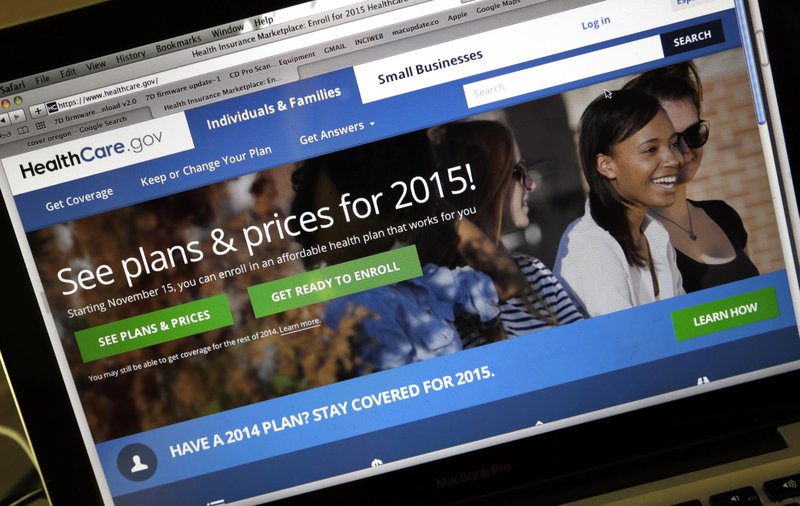WASHINGTON -- More than 10 million people have signed up for private health insurance this year under President Barack Obama's law, the administration said Tuesday.
The report from the Department of Health and Human Services comes as dozens of insurers are proposing double-digit premium increases for next year, raising concerns about future affordability. And the Supreme Court is weighing the legality of subsidized premiums for millions of consumers in more than 30 states. A decision is due around the end of the month.
The 10.2 million sign-ups represent consumers who enrolled in a plan and followed through by paying their first month's premiums. That number will fluctuate during the year as some people get jobs that offer coverage, and others decide to drop their insurance.
The figures released Tuesday cover the period through March 31.
Although the number of sign-ups exceeds a target of 9.1 million set last year by Health and Human Services Secretary Sylvia Burwell, it's not much of a cushion.
"Enrollment has been lower and slower than what most people projected," said Caroline Pearson of the data-analysis firm Avalere Health.
Still, the combination of subsidized private coverage sold through online insurance exchanges in every state, along with Medicaid expansion in most states, has resulted in historic coverage gains. Nearly 9 out of 10 adults now have health insurance.
Health insurance is now a federal mandate for most people, with employer plans remaining as the mainstay for workers and their families. Violators risk fines and penalties.
But health insurance numbers could decrease again if the Supreme Court invalidates subsidies for people in states using healthcare.gov, the federal government's online exchange.
In the 34 states most directly affected, nearly 6.4 million people could lose subsidies worth more than $1.7 billion a month. Without financial assistance, it's likely that most of those consumers would drop coverage. As healthy people exit the market, premiums would spike for the remaining customers buying individual health insurance policies.
The loss of subsidies would be particularly difficult when combined with the proposed premium increases for 2016.
Dozens of health insurers said higher-than-expected care costs and other expenses blindsided them this year and they're going to have to raise premiums for individual policies more than 10 percent.
The proposed increases would apply to plans sold on the health insurance exchanges created the health law, as well as individual coverage sold through brokers and agents.
Insurers pointed to costs from customers they gained under the health care overhaul's coverage expansion and the rising expense of prescription drugs among other reasons for their planned increases, according to preliminary rate information released Monday on healthcare.gov.
The court case on the subsidies revolves around the literal meaning of a handful of words in the complex health care law.
Opponents said the law only allows subsidies in states that set up their own insurance exchanges. Only 13 states and Washington, D.C., are running their own markets this year. The administration has said that, when read in context, the law allows subsidies in all 50 states regardless of whether the federal healthcare.gov is in charge of sign-ups.
Nationally, 8.7 million people are getting an average of $272 a month, which covers most of their premiums. The national figure includes residents of states running their own insurance markets.
Florida would be the biggest loser if the Supreme Court overturns subsidies, with 1.3 million residents losing nearly $390 million a month in financial assistance. The subsidies are delivered as tax credits and paid directly to insurers on behalf of consumers.
Overall, 87 percent of the customers in states that would bear the consequences of the court ruling are receiving subsidies.
The Obama administration said it expects to win in court, and officials said there is no backup plan if they lose the case. Leading congressional Republicans are promising to help consumers who lose subsidies, but it's unclear whether Congress could pass any fix that Obama would sign.
Meanwhile, on Tuesday, the Republican-run House Ways and Means Committee voted to repeal a 2.3 percent tax on many medical devices that helps pay for the health care overhaul.
The mostly party-line 25-14 vote came with Republicans saying the levy costs jobs and stifles innovation.
Democrats say those claims are exaggerations and said Republicans have offered no savings to cover the $24.4 billion in lost revenue the repeal would cost over the coming decade.
The bill was "the obvious effort of Republicans to essentially piece by piece, if they can't do it entirely, to repeal" Obama's health law, said Rep. Sander Levin, D-Mich.
Information for this article was contributed by Tom Murphy, Emery P. Dalesio and Alan Fram of The Associated Press.
A Section on 06/03/2015
